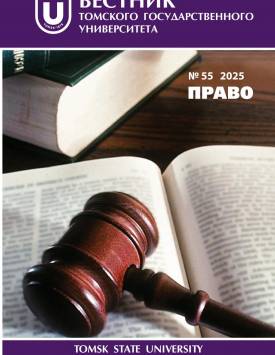Good faith in civil law: legislation, doctrine, case law
The purpose of this publication is to provide a comprehensive analysis of the current civil legislation, legal doctrine, and modern case law with regard to the understanding of the obligation of good faith and its implementation in the practice of property relations between participants in civil turnover. In this context, the author sets the following objectives: to evaluate the results of the modernization of codified civil legislation from the perspective of this requirement; to construct a collective image of the category of good faith as an outcome of scholarly inquiry; and to demonstrate, using specific examples from both Russian and foreign case law, the challenges of applying this requirement in the texts of adopted judicial decisions. The article is based on the analysis of publications by Russian and foreign civil law scholars, including researchers from the USA, Germany, Canada, South Africa, and Nigeria. In the course of the study, general scientific methods were employed, including analysis, synthesis, induction and deduction, comparison, and abstraction, as well as specific legal methods, including comparative legal analysis, systemic interpretation, and legal modeling. The article arrives at the following conclusions: 1. Since good faith, in a broad philosophical sense, consists in preserving human dignity, attentiveness to the higher aspirations of the spirit and life, the scholarly exploration of this concept carries significant educational value. It inspires new generations to engage in scientific inquiry and to uphold and enrich moral ideals. 2. It can be stated that the objective of modernizing civil legislation-namely, the consistent incorporation of the principle of good faith into its content-has been achieved. 3. In its positive form, which characterizes the behavior of participants in civil transactions, good faith encompasses the requirements of honesty, trust, benevolence, truthfulness, diligence, impartiality, integrity, humanity, solidarity, and equality. In its negative form, good faith implies a prohibition on obtaining unjust advantages and on abusive conduct by participants in civil turnover. 4. The obligation of good faith enables contracting parties, with the assistance of judicial authorities, to prevent the imposition of excessively broad obligations by the other party-particularly in cases involving financial institutions. It also protects implied or ancillary obligations, including those arising from the nature of the transaction, and serves to strengthen the stability of contracts that conform to moral standards and good conscience. 5. In the absence of a precise statutory definition, the concept of good faith possesses ethical value, allowing courts to remedy instances of injustice on a case-by-case basis and serving as a general guiding principle for the development of civil legislation. The author declares no conflicts of interests.
Keywords
civil legislation,
fundamental principles,
good faith,
reasonableness,
fairness,
case lawAuthors
| Shchennikova Larisa V. | Kuban State University | shchennikova_larisa@mail.ru |
Всего: 1
References
Абай Кунанбаев: 10 афоризмов казахского поэта и философа. URL: https://eksmo.ru/articles/abay-kunanbaev-10-aforizmov-kazakhskogo-poeta-i-filosofa--ID3109636/(дата обращения: 08.05.2024).
Кожевников В.А. О добросовестности в вере и неверии. СПб. : Лань, 2013. 16 с.
Смолин М.Б. Отношение социализма к религии вообще и к христианству в частности. URL: https://moskvam.ru/publications/pubhcation_1722.html (дата обращения: 08.05.2024).
Гражданский кодекс Российской Федерации (часть первая) от 30.11.1994 № 51-ФЗ // Российская газета. 1994. № 238-239.
Ожегов С.И. Словарь русского языка: около 57 000 слов / под ред. Н.Ю. Шведовой. 10-е изд., стер. М. : Сов. энциклопедия, 1973. 846 с.
Агарков М.М. Проблема злоупотребления правом в советском гражданском праве // Избранимте труды по гражданскому праву : в 2 т. М. : Центр ЮрИнфоР, 2002. Т. 2. 489 с.
Новицкий И. Б. Принцип доброй совести в проекте обязательственного права // Вестник гражданского права. 1916. № 6. С. 59-66.
Даль В.И. Толковый словарь живого великорусского языка : в 4 т. / предисл. А.М. Бабкина. 7-е изд. М. : Рус. яз., 1978. Т. 1. 688 с.
Жалинский А., Рёрихт А. Введение в немецкое право. М. : Спарк, 2001. 767 с.
Розенберг М. Г. Международная купля-продажа товаров. Комментарий к правовому регулированию и практике разрешения споров. М. : Статут, 2003. 323 с.
Белов В. А. Добросовестность, разумность, справедливость как принципы гражданского права // Законодательство. 1998. № 8. С. 49-52.
Дождев Д.В. Европейская традиция частного права: исследования по римскому и сравнительному праву : в 2 т. М. : Статут, 2021. Т. 1. 457 с.
Богданов Е. Категория «добросовестности» в гражданском праве // Российская юстиция. 1999. № 9. С. 13-15.
Краснова С.А. Определение понятия «добросовестность» в российском гражданском праве // Журнал российского права. 2003. № 3. С. 62-67.
Kolb R. Principles as Sources of International Law (with Special Reference to Good Faith) // Netherlands International Law Review. 2006. № 53. P. 1-36.
Malkawi B.H. Good Faith Under the CISG and UAE Law. URL: https://papers.ssrn.com/sol3/papers.cfm?abstract_id=3382725#paper-references-widget (дата обращения: 08.05.2024).
Bork K., Wandt M. «Utmost» good faith in German contract law // ZVersWiss. 2020. № 109. P. 243-254.
Hutchison A. Good Faith In Contract: A Uniquely South African Perspective // Journal of Commonwealth Law. 2019. Vol. 1. P. 227-271.
Akinkugbe D.O. To Recognize or Not? Good Faith Under Nigerian Law of Contract // Journal of Commonwealth Law. 2019. Vol. 1. P. 363-402.
Churchill Falls (Labrador) Corp. v. Hydro-Quebec. URL: https://www.can-lii.org/en/ca/scc/doc/2018/2018scc46/2018scc46.html (дата обращения: 08.05.2024).
Sasfin (Proprietary) Limited And Hendrik Johannes Stefanus Beukes. URL: https://www.saflii.org/za/cases/ZASCA/1988/94.html (дата обращения: 08.05.2024).
Определение Судебной коллегии по гражданским делам Верховного Суда Российской Федерации от 19.12.2023 по делу № 44-Кг23-18-К7. URL: https://www.consultant.ru/cons/cgi/online.cgi?req=doc&base=ARB&n=797686#5xeAM9UV mCtbUFc5 (дата обращения: 08.05.2024).
Определение Судебной коллегии по гражданским делам Верховного Суда Российской Федерации от 17.01.2023 № 5-КГ22-121-К2. URL: https://www.consultant.ru/cons/cgi/online.cgi?req=doc&base=ARB&n=748987#RtlCM9UCQ70lvgO71 (дата обращения: 08.05.2024).
Определение Судебной коллегии по гражданским делам Верховного Суда Российской Федерации от 14.11.2023 № 16-КГ23-57-К4. URL: https://www.consultant.ru/cons/cgi/online.cgi?req=doc&base=ARB&n=792615#TEmEM9UyGcoFrZPF 1 (дата обращения: 08.05.2024).

